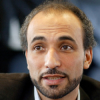Tariq Ramadan

Tariq Ramadan
Tariq Ramadanis a Swiss academic, philosopher and writer. He is the professor of Contemporary Islamic Studies in the Faculty of Oriental Studies at St Antony's College, Oxford and also teaches at the Oxford Faculty of Theology. He is a visiting professor at the Faculty of Islamic Studies, the Université Mundiapolisand several other universities around world. He is also a senior research fellow at Doshisha University. He is the director of the Research Centre of Islamic Legislation and Ethics, based in...
NationalitySwiss
ProfessionWriter
Date of Birth26 August 1962
CountrySwitzerland
For me I made it clear that I wanted to meet with both sides of the political spectrum.
We have talked about revoking French citizenship for some individuals. Therefore, I have decided to apply for citizenship, which in a way points out the contradictions of this bill that states the forfeiture of French citizenship exclusively to individuals holding dual nationalities. Through this application, I put myself in the midst of the French political debate and discredit everything that might be said against me about this matter.
Things need to be properly named. Political confusion starts with terminology confusion. Islamism implies some sort of political and social plan for Muslim people. In that classification, we find different categories.
I think we are making a mistake, a very big mistake if we look at what we call the Arab Awakening only by looking at the whole dynamics in political and not in economic terms.
Fear and its accompanying emotional reactions have become part of the public mindset. Such reactions, while often legitimate, are also being exploited with increasing frequency for political ends.
Being Muslim has become synonymous with pointed questions, with tension and mistrust, even with conflict. It has become a global phenomenon with profound consequences for inter-communal relations, political rhetoric and policies at the local, regional, national and international level.
Nevertheless, I have no political agenda whatsoever, even though some might think the contrary.
Tunisia's responsibility, and especially that of its political and intellectual elites, is enormous. All the protagonists of the nation's social, cultural, economic and political life must work to overcome useless and counterproductive polarisation, and to find solutions to domestic, regional and international problems.
Political rhetoric leads only to confusion.
You can't say 'I don't do politics,' because silence is a political statement.
In my book, the Arab Awakening, I talk about the fact that we have to move from this. All the contemporary ideologies of political Islam have been based on the nation state. The nation state is very problematic but I'm not sure if we have an alternative political model.
Times have changed; so must the lenses through which we see the political future.
It's clear there is nothing in my record supporting terrorism.
We all cherish freedom of speech, but with a reasonable approach and a reasonable use of it. If we come to this, it is a debate. If not, then it is a power struggle. Who is going to win, the Muslim principles or the Western principles?